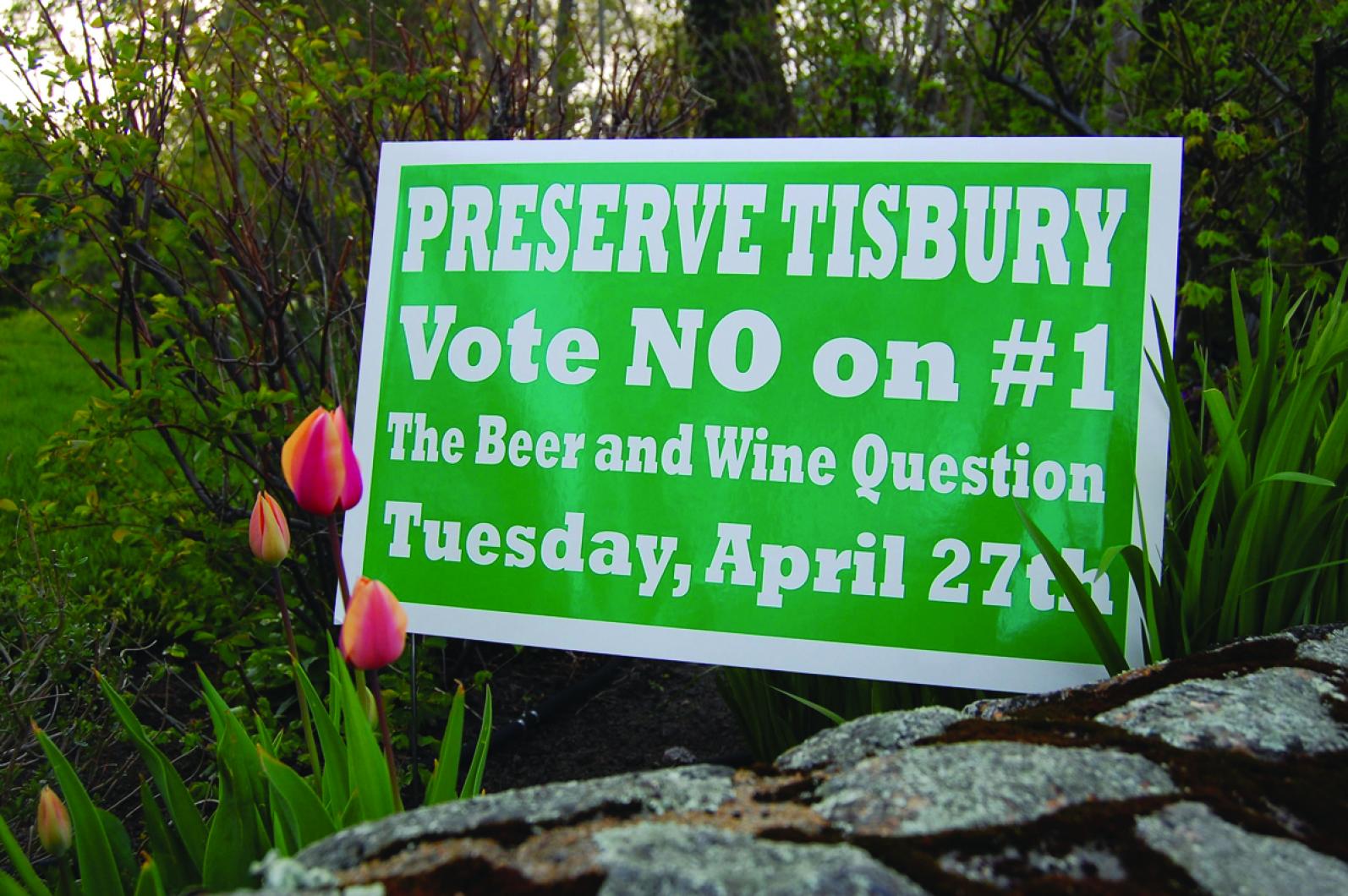After five years of division over whether or not beer and wine should be sold in Tisbury restaurants, five years of discussion and debate, ceaseless lobbying and innumerable letters to the editor, the issue will go to a vote of the townspeople this Tuesday.
If it succeeds, the ballot question will allow restaurant sales, under stringent conditions. Only beer and wine may be served, and only to diners who are seated and eating what are considered substantial meals. Only restaurants capable of seating at least 30 will be eligible for licenses. The restaurants must make most of their money through food sales, not alcohol. There are a number of other conditions as well.
The election will be held at the American Legion Hall; polling hours are from noon to 8 p.m.
The pro-sales group is led by town businesses, particularly the owners of the inns and restaurants, and they are in favor for one main reason: they believe they will benefit from improved trade. Restaurants in Vineyard Haven lose trade to the licensed establishments of Oak Bluffs and Edgartown, they argue, and they need to compete.
All three Tisbury selectmen — and all the candidates for the selectman’s election that will be held the same day as the beer and wine ballot — also support the measure, arguing it will bring money to town, and not just to the restaurants.
Those who oppose beer and wine, though, have many reasons: concerns about safety on the roads and on the harbor, about increased drunkenness, the costs of extra policing, the types of tourists who might be drawn to the town. Not to mention the concern that it will make dining out a much more expensive proposition if you have to buy drinks at restaurant prices, instead of bringing your own alcohol, bought at bottle-shop prices.
There also is the thin end of the wedge argument, too, mounted by opponents. Exactly how many establishments will get licenses? And how long before the pro-alcohol lobby starts pushing for more, like bars?
The form of the question which will be before the people on Tuesday has given that argument some legs over recent weeks.
The question says: “Shall the board of selectmen of the town of Tisbury be authorized to grant 19 licenses for the sale of wines and malt beverages to be drunk on the premises to restaurants, including restaurants within inns and hotels, with seating capacities of not less than 30 persons, to be consumed with meals only, and only to patrons who are seated at dining tables, and to grant seasonal licenses for the same as the selectmen may determine.”
Despite the attempts by selectmen to assure voters that they will not necessarily issue as many licenses as are provided for in the question’s wording, opponents have seized on the numbers.
The numbers contained in the ballot question, as selectman Geoghan Coogan explained recently in a letter to this paper, are the result of state requirements.
The town needed state approval to proceed with the ballot, and the state required numbers. “Senate counsel informed the town that it had two options. First, we could request a specific number of licenses. Second, we could request the number of licenses permitted by the so-called quota system under the general laws of the commonwealth,” Mr. Coogan wrote.
For a town with a year-round population the size of Tisbury’s, the quota would have allowed 14 full licenses (that is all-alcohol) and five licenses for beer and wine only.
“As a board, we believed that there were probably more than 14 potential year-round operations that would apply for a license if this ballot question were successful,” Mr. Coogan said.
“The number 19 was the number of restaurants we felt could possibly obtain a license, assuming all of the potential sites met all of the other guidelines for obtaining a license to operate a restaurant and serve alcohol.”
So they preferred to go for 19, rather than face the problem of having to choose from the outset.
As for seasonal licenses, the state does not set a quota.
Mr. Coogan’s letter, with its confirmation that the selectmen anticipated at least 14, and possibly as many as 19 applications was the closest the board has come to suggesting how many licenses they ultimately will grant.
Previously, at a March working meeting of the selectmen and interested parties to discuss the regulations, Mr. Coogan said the indications were that only seven or eight places would seek year-round licenses.
So the numbers that might ultimately be licensed remains uncertain.
And so does the outcome of the vote.
The one thing which does appear certain about Tuesday’s ballot, is that whoever wins, a substantial minority is going to be unhappy with the outcome. A vote does not end a controversy, it decides a winner.
And sometimes it does not even do that, as was demonstrated two years ago, when Tisbury voters last went to the polls on the beer and wine question.
The result was a tie: 690 all. In a recount, they found two more no votes.
But that vote did nothing to end the controversy. Those in favor of beer and wine sales promptly restarted the tortuous process of having beer and wine sales approved. And the debate, lobbying and letters, for and against, continued to flow unabated.
The beer and wine question is only one of six questions up for decision on Tuesday. The other four all relate to town spending, which will slightly increase the tax rates of residents.
Question two seeks to raise an additional $225,000 to fund a new contract with the Tisbury police.
Question three proposes spending $120,000 on a new refuse truck; question four proposes spending $20,000 for a new road sander; question five seeks $20,000 for painting the senior center; question six seeks $75,000 to go toward a new generator for the school.




Comments
Comment policy »